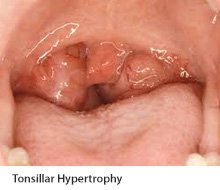We will all get a sore throat from time to time. The most common reason for a sore throat is a viral or bacterial infection, and it tends to part of an upper respiratory tract infection (URTI). In most cases, sore throats heal on their own within a week.
Causes
Infective
-
Viral & Bacterial Infection (URTI)
- Sometimes our immune system may be weakened by stress, not drinking enough water, etc.
- Common to have 1-3 episodes of URTI and sore throat a year
-
Recurrent Tonsillitis

- Recurrent URTI may lead to enlarged tonsils, which is associated with recurrent sore throat, obstructive sleep apnea, difficulty swallowing and muffled speech
- Tonsil removal may be recommended
-
Cold Sores
- Comes in the form of small blisters that develop on the lip or around the mouth
- Caused by the herpes simplex virus
- Usually clears up without treatment in 7-10 days
Non-Infective
-
Laryngopharyngeal Reflux
- Happens when acid from the stomach backflows up through the throat
- Commonly presents with phlegm, throat clearing and cough
-
Voice Overuse
- Excessive use of the voice – e.g. frequent shouting, talking, singing
-
Autoimmune Conditions
- Occurs when the body’s immune system attacks healthy tissue by mistake
- In the mouth, this is associated with ulcers that can sometimes be so large that it impedes swallowing
- As autoimmune disorders can affect many parts of the body, your doctor may order a blood test or a biopsy of the ulcers if he suspects you have this condition
Treatment
You should see a doctor if your sore throat symptoms do not resolve within a week, or if they are so severe that it prevents you from eating, swallowing or breathing.
Most URTI's are treated symptomatically with painkillers, nasal decongestants, cough suppressants and plenty of rest and water.
Sometimes, your doctor may prescribe antibiotics if he thinks the infection is bacterial in origin (most URTIs are caused by viruses).

